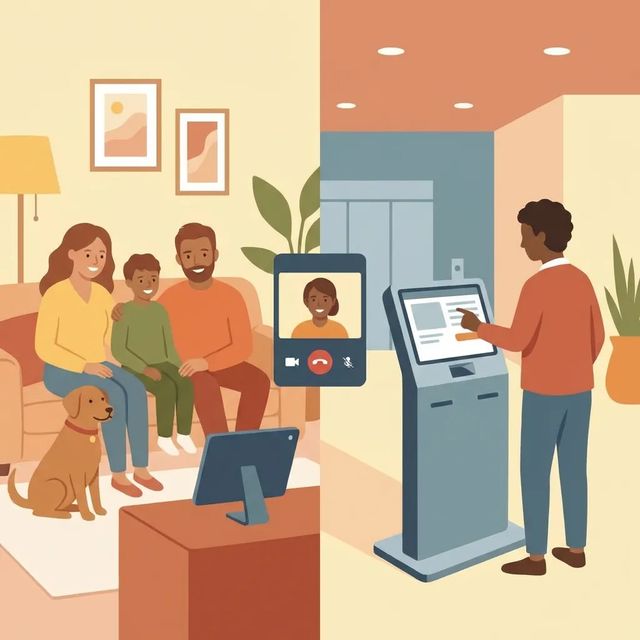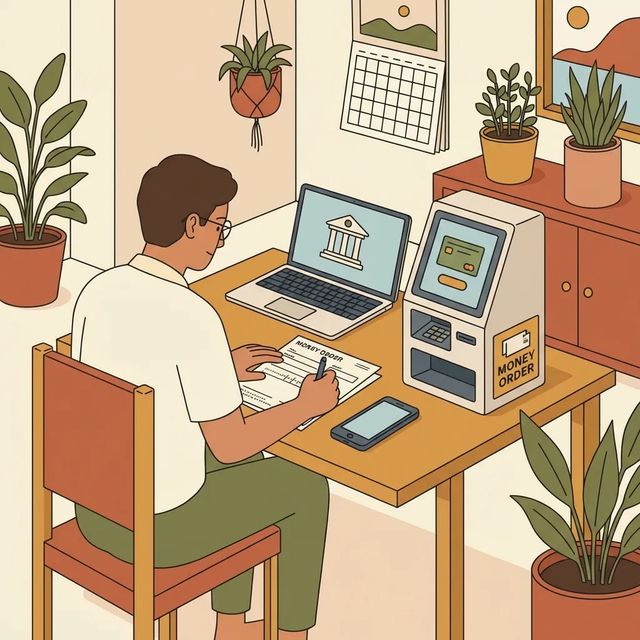Pima County Jail, AZ
Explore
Find an Inmate at Pima County Jail, AZ
Search for a loved one and send messages and photos in minutes.

Guides for This Facility

How to Contact an Inmate at Pima County Jail, AZ (AZ)
Trying to connect with someone at Pima County Jail? Your two main options are video visitation (scheduled ahead of time) and the jail's voicemail system.
Read Guide
How to Send Money to Pima County Jail, AZ (AZ)
Sending money to someone at Pima County Jail is usually easiest online or by phone, but you can also mail a money order or government check if it's labeled correctly. Here's what to do, and what to double-check before you send anything.
Read Guide
Video Visits from Home at Pima County Jail: How the 'Visit Now' Feature Works
If you’re trying to catch a video visit from home at Pima County Jail, “Visit Now” is the feature that makes it possible. Here’s what it is, what you need set up on your phone, and what to do if you miss a call.
Read GuideAt a Glance
Visitation
- Inmates become eligible for visits after their first court appearance and assignment to a permanent housing unit.
- On-site video visits: one free 30-minute visit per inmate per week; additional 30-minute visits cost $9 per inmate per day.
- Remote (online) visits are limited to 15 minutes and are charged at $0.25 per minute.
Communication
- Family and friends must create a ConnectNetwork account at www.connectnetwork.com to send e-messages to inmates.
- Each e-message to Pima County Jail can be up to 2,000 characters long.
- Cost per e-message is $0.25.
Sending Money
- You must know the inmate’s 9-digit PIN to add funds (prepend zeros if necessary).
- You can add funds at ConnectNetwork.com or by calling (800) 483-8314.
- Mailed money orders or government checks must be addressed 'Inmate Trust Account' and include the inmate’s name, pod location, and booking number.
Based on official sources and community feedback. Learn how we verify
Topic Overviews
Visitation
All visitation at Pima County Jail is video-only. You can either visit on-site (one free 30-minute session per inmate per week, with additional 30-minute blocks at $9 per inmate per day) or connect remotely online (15 minutes max, billed at $0.25 per minute). Visiting hours run Monday through Friday, 8:30 a.m. to 6:00 p.m., and Sunday through Saturday, 8:30 a.m. to 5:00 p.m. No visits on Federal Holidays. Schedule your visit at pimacountyaz.gtlvisitme.com or at a kiosk. If you run into scheduling issues, call Visitor Support at 855-208-7349. For on-site visits, check in at the Main Jail Front Desk (1270 W. Silverlake Road, Tucson, AZ) 15 minutes early and bring a valid photo ID. Be aware that visits may be monitored and recorded. Rule violations can lead to cancellations or suspensions.
Read full guideCommunication
Messaging someone at Pima County Jail goes through ConnectNetwork. Create an account at www.connectnetwork.com, then send e-messages of up to 2,000 characters. Each message costs $0.25, and they're processed and delivered Monday through Friday. To buy message credits, use the ConnectNetwork email center at (877) 650-4249. You can also leave a voicemail by calling (520) 448-3426, selecting your language, entering the inmate's name or number, and recording up to a two-minute message. Voicemails cost $2.00, deducted from the inmate's AdvancePay account. For help with deposits or account issues, call AdvancePay at (800) 483-8314 or GTL Customer Service at (866) 230-7761.
Read full guideSending Money
Pima County Jail accepts deposits online or by phone through ConnectNetwork. You can add funds at ConnectNetwork.com or by calling (800) 483-8314. You'll need the inmate's 9-digit PIN (add leading zeros if needed to reach nine digits). Prefer to mail funds? Send a money order or government check addressed to "Inmate Trust Account" and include the inmate's name, pod location, and booking number so it gets credited correctly. Mail deposits go to P.O. Box 951, Tucson. Deposited funds can be used for commissary, telephone, or other authorized accounts. Follow the deposit instructions exactly to avoid delays or returned payments.
Read full guideCommon Questions
Showing 6 of 9What are the visiting hours at Pima County Jail?
Hours are Monday through Friday from 8:30 a.m. to 6:00 p.m., and Sunday through Saturday from 8:30 a.m. to 5:00 p.m. No visitation on Federal Holidays.
VisitationHow do I schedule a visit at Pima County Jail?
Schedule all visits online at pimacountyaz.gtlvisitme.com or at an on-site kiosk. If you have scheduling problems, call Visitor Support at 855-208-7349. For an on-site visit, check in 15 minutes early at the Main Jail Front Desk at 1270 W. Silverlake Road.
VisitationWhat ID do I need to visit someone at Pima County Jail?
You must have a valid photo ID to visit. Accepted IDs include a driver’s license, DES ID, Arizona ID, Military ID, passport, travel visa (including U.S. B1/B2), Border Crossing card, Resident Alien card, or a work permit.
VisitationHow do I send an e-message to an inmate at Pima County Jail?
Start by creating an account at www.connectnetwork.com. From there, you can send e-messages of up to 2,000 characters for $0.25 each. Messages are processed Monday through Friday. Buy credits through the ConnectNetwork email center at (877) 650-4249.
CommunicationHow do I leave a voicemail for an inmate at Pima County Jail?
Call (520) 448-3426, select your language, enter the inmate’s name or number, and record your message. Voicemails can be up to two minutes, and the $2.00 charge is deducted from the inmate’s AdvancePay account.
CommunicationWho do I contact for deposit or technical help with inmate communication accounts?
For AdvancePay account help, call (800) 483-8314. For technical support, call GTL Customer Service at (866) 230-7761 (hours listed by GTL are Mon to Fri 7 a.m. to 11 p.m. Central, Sat to Sun 8 a.m. to 7 p.m. Central).
CommunicationMore Guides
Ready to Connect?
Search for your loved one to start communicating today
Did You Know?
Visiting someone at Pima County Jail in Arizona? Inmates become eligible for visits after their first court appearance and assignment to a permanent housing unit.
This guide is based on feedback from 56 families and official facility documentation. Learn how we verify
